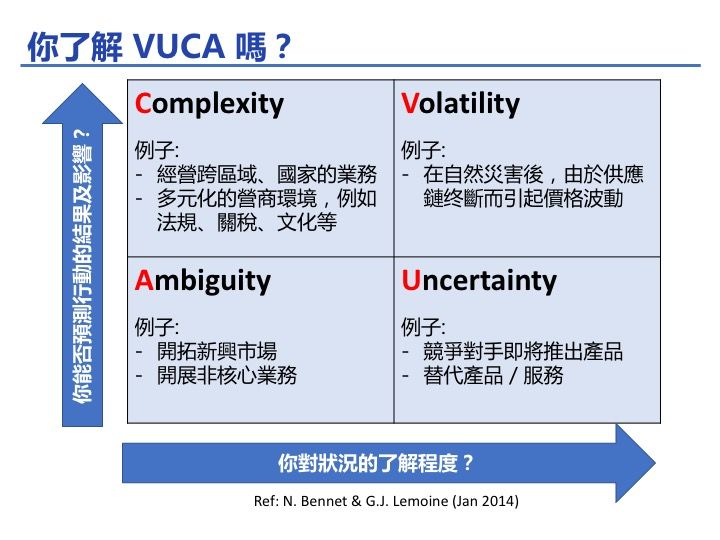
周遊中東及亞洲地區主持領導培訓。全球唯一可以用英語、國語或廣東話主講不同測評工具(MBTI®, FIRO®, LEA, SPA)的認證培訓,代表 The Myers Briggs Company® 及 Management Research Group 在大中華地區開辦國際認證班。
Do you know VUCA?
In fact, the word VUCA has been popular for more than ten years, but in my recent seminars, I found that many people still do not know what it means.
VUCA is short for four words: Volatility, Uncertainty, Complexity and Ambiguity. This originated from the US military and was originally used to describe four different combat states. About ten years ago, before and after the financial tsunami, some people began to apply it in business scenarios. These four words look very similar, I try to explain it to you with a model and different examples.
We can use two dimensions to produce a matrix to analyze VUCA (see figure). The two dimensions are:
1) How well can you predict the outcome and impact of your actions?
2) How well do you know the situation?

Examples are listed below:
Volatility
After natural disasters such as earthquakes, typhoons, and tsunamis, prices fluctuate due to supply chain disruptions. Fortunately, it was short-lived, but it also brought some distractions.
Uncertainty
Thanks to advances in technology, it's getting easier for your competitors to develop new products and even copy yours. In addition, technology also brings alternative products or services. For example, the competitors of department stores were originally only other brick-and-mortar stores, but the advancement of the Internet brought the rise of e-commerce. The traditional banking industry was originally limited to financial service institutions, but in the past decade, a group of Internet financial opponents have emerged.
Complexity
The most classic example is multinational companies, which operate in different countries and need to deal with a diverse business environment, including regulations, tariffs, and cultures. In the last century, European and American companies may have come to Asia for development, but in the past decade, we have seen many Chinese, Japanese, Korean and other Asian companies expand their business overseas. For example, a Chinese e-commerce company has acquired local companies in Indonesia and Thailand, which has become complicated in terms of organizational management and business.
Ambiguity blur
When you are trying to develop an emerging market or a non-core business, you enter an unfamiliar territory and each step is like advancing in the fog. For example, real estate companies need to carry out health care and pharmaceutical businesses; traditional electrical appliance manufacturing companies are transformed into cloud service providers. Entire businesses leave their comfort zone and experiment a lot over an extended period of time.
VUCA can bring many unpredictable anxieties and challenges, but also many opportunities. I think VUCA is already a reality that we have to face, not an option.
Like my work?
Don't forget to support or like, so I know you are with me..
Comment…